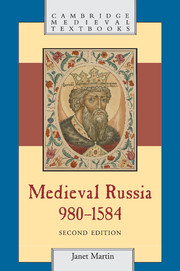Book contents
- Frontmatter
- Contents
- List of illustrations
- Acknowledgments
- Note on names, dates, and transliteration
- Chronology
- List of abbreviations
- 1 The era of Vladimir I
- 2 Princes and politics (1015–1125)
- 3 Kievan Rusˈ society
- 4 Kievan Rusˈ: the final century
- 5 The Golden Horde
- 6 The Russian lands within the Golden Horde
- 7 The Daniilovich ascension
- 8 The unification and centralization of Muscovy
- 9 Muscovite domestic consolidation
- 10 Foreign policy and foreign trade
- 11 Ivan IV the Terrible
- 12 Conclusions and controversies
- Select bibliography
- Index
- Cambridge Medieval Textbooks
6 - The Russian lands within the Golden Horde
Published online by Cambridge University Press: 05 June 2012
- Frontmatter
- Contents
- List of illustrations
- Acknowledgments
- Note on names, dates, and transliteration
- Chronology
- List of abbreviations
- 1 The era of Vladimir I
- 2 Princes and politics (1015–1125)
- 3 Kievan Rusˈ society
- 4 Kievan Rusˈ: the final century
- 5 The Golden Horde
- 6 The Russian lands within the Golden Horde
- 7 The Daniilovich ascension
- 8 The unification and centralization of Muscovy
- 9 Muscovite domestic consolidation
- 10 Foreign policy and foreign trade
- 11 Ivan IV the Terrible
- 12 Conclusions and controversies
- Select bibliography
- Index
- Cambridge Medieval Textbooks
Summary
The Mongol invasion was a pivotal point in the history of the Russian lands. The Mongol onslaught marked the end of Kievan Rusˈ as a viable and integrated political entity. The city of Kiev itself, sacked and ravaged, lost its political, commercial, and, ultimately, ecclesiastical centrality. The presence of the Mongols, acting as a mallet driving a wedge into already visible fracture lines, created gaping political and cultural fissures between the southwestern and northeastern principalities. Although individual princes maintained close ties, marked by marriages and alliances, within a century of the Mongols' arrival, the southwestern lands became attached to Lithuania and Poland, while the northeastern principalities, under Golden Horde dominance, began the process that transformed them into the state of Muscovy.
The precise nature of the Mongol influence over that process has been the subject of wide-ranging debate. At one extreme are the classic views shaped by the Russian historians S. M. Solovˈev and V. O. Kliuchevskii, who saw little or no Mongol imprint on the development of Muscovy. At the opposite extreme is the position that Mongol domination had deep and enduring effects. But the character of the observed effects, how they were transmitted, and when they manifested themselves are also all topics of debate. These issues, encompassed in an examination of the development of the northeastern Russian lands into the state of Muscovy while under the dominance of the Golden Horde, will be explored in this and the following chapter.
- Type
- Chapter
- Information
- Medieval Russia, 980–1584 , pp. 175 - 219Publisher: Cambridge University PressPrint publication year: 2007



